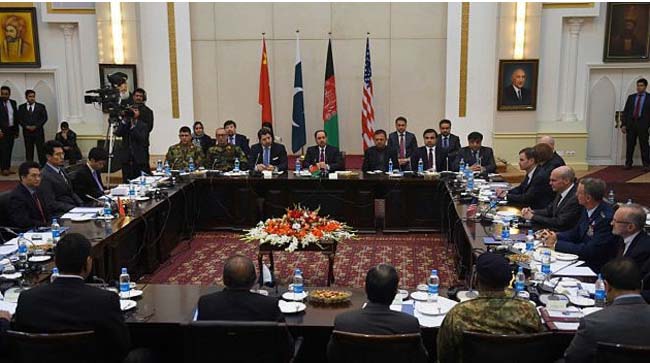KABUL - Representatives from four countries gathered in Kabul on Monday called on the Taliban to resume peace talks with the Afghan government.
Senior officials from Afghanistan, Pakistan, China and the United States met for most of the day at the Presidential Palace amid tight security, a week after a first round of discussions in the Pakistani capital, Islamabad.
In a joint statement released by the Afghan Foreign Ministry, they said the talks "made progress on a roadmap toward initiating peace talks with Taliban groups. It said they hope to bring the two sides together for talks "aimed at reduction of violence and establishing lasting peace in Afghanistan and the region."
The four-nation group "called on all Taliban groups to enter into early talks with the Afghan government," and agreed to meet again in Islamabad on Feb. 6. The insurgents are not represented at the talks.
Foreign Minister Salahuddin Rabbani opened the meeting at the Presidential Palace in the center of the capital calling on the Taliban to "accept the government's call for peace through dialogue."
"There isn't a single Afghan family that hasn't been affected by the daily acts of brutal and deadly terrorism carried out across our cities, towns, and villages," Rabbani said in the televised speech.
"I take this opportunity and call on all Taliban groups to accept our call for peace through dialogue, and to come to the table for talks so that we can resolve all differences politically and ensure the rightful and just desire of the Afghan people for lasting peace," he said.
An official close to the process said that another two "preparatory" meetings are expected to take place.
"There are different opinions about the methodologies and approaches in resuming these talks," the official said on condition of anonymity because he was not authorized to speak to journalists.
The roadmap would include "who do they want to talk to, on what timetable, what incentives are to be offered, and what kind of action will be taken with those people who want to talk and those who do not want to talk," the official said.
The Afghan government expects Pakistan to use its influence with Taliban groups, whose leaders are reportedly in Pakistan, to bring the level of violence down, and to use force against groups that refuse to come to the table for negotiations.
Pakistan says that its influence with the Taliban is “limited” and the use of force would be counterproductive until all other measures have been exhausted.
“Threat of the use of military action against irreconcilables [those unwilling to talk] cannot precede the offer of talks to all the groups and their response to such offers,” said Sartaj Aziz, adviser to Pakistan’s prime minister on foreign affairs, in his opening statement to the first QCG meeting.
The meetings are part of a three-step process, said Abdul Hakim Mujahid of Kabul's High Peace Council, tasked with ending the war. Mujahid also served in the Taliban's 1996-2001 administration.
"The first step is to formulate a roadmap, the second is to invite the armed opposition to the negotiating table and the last step is the implementation of the peace plan," Mujahid told The Associated Press.
Kabul held direct talks with the Taliban for the first time last summer in Islamabad, but that process collapsed after Afghanistan announced that longtime Taliban leader Mullah Mohammad Omar had died more than two years ago in Pakistan. The announcement set off an internal rivalry among the Taliban, raising questions about who would represent them in negotiations. Analysts have said it will be months before direct talks resume.
The war meanwhile shows no sign of abating, with the Taliban challenging Afghan forces on a number of fronts since the U.S. and NATO formally concluded their combat mission at the end of last year.
Nine policemen were shot dead by a colleague at a checkpoint in Uruzgan province early Monday, according to security officials, who requested anonymity because they were not authorized to speak with media. The attacker took all weapons from the checkpoint before escaping, they said.
In a similar incident late Sunday, a policeman killed four colleagues at a checkpoint in Lashkar Gah, capital of the southern Helmand province, said provincial police chief Gen. Abdul Rahman Sarjang. (Agencies)

